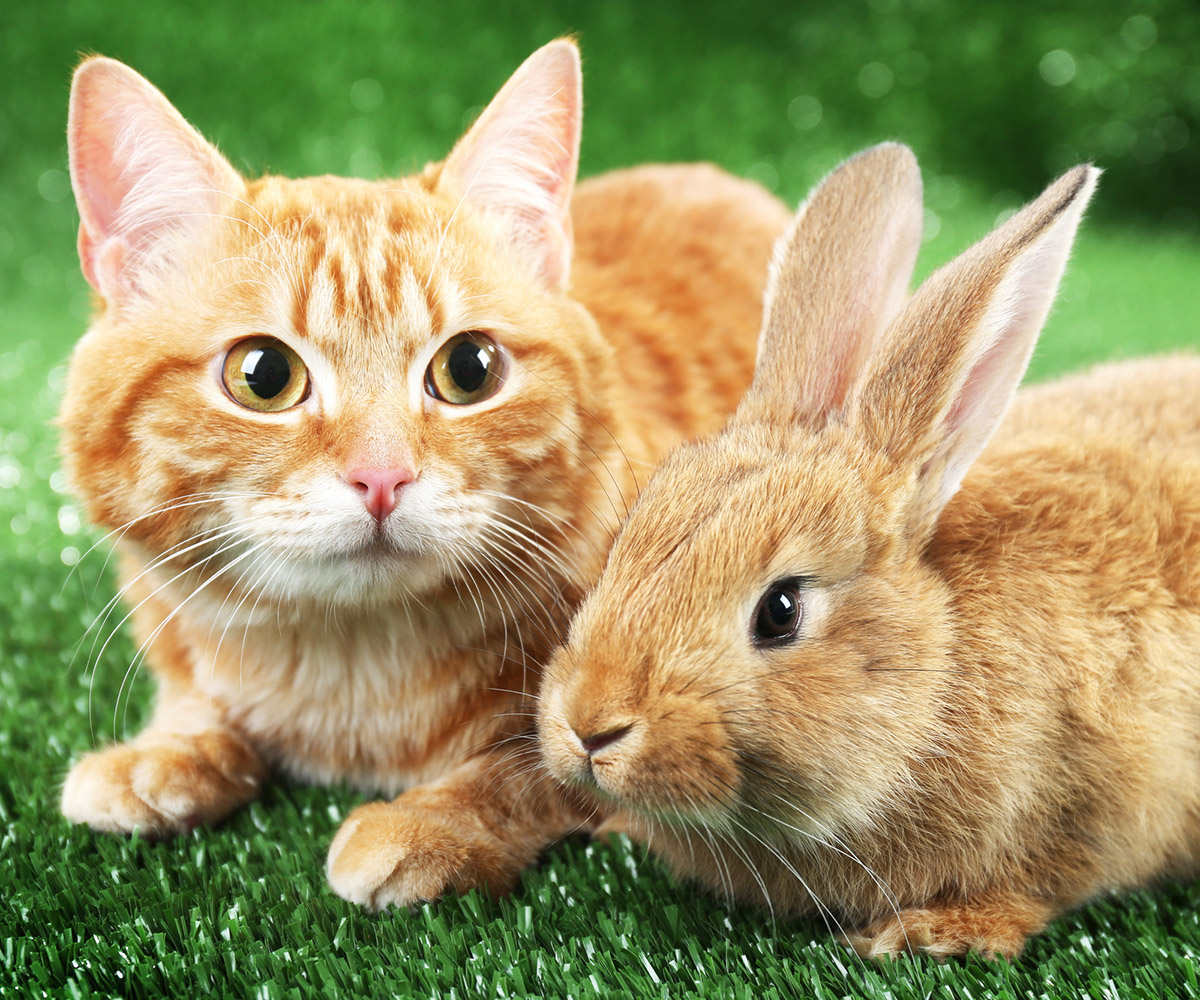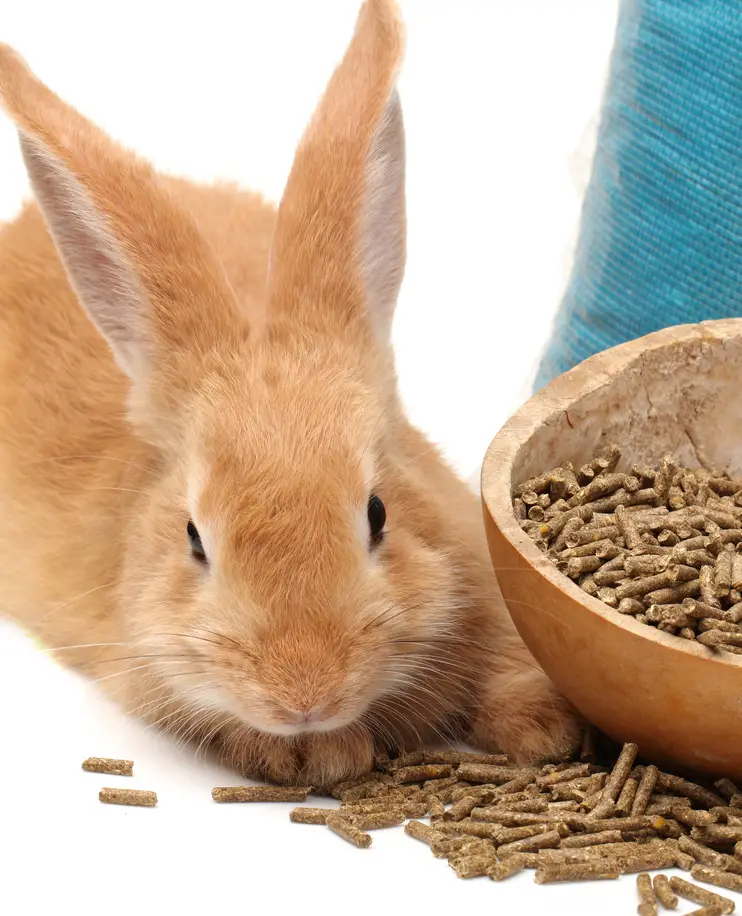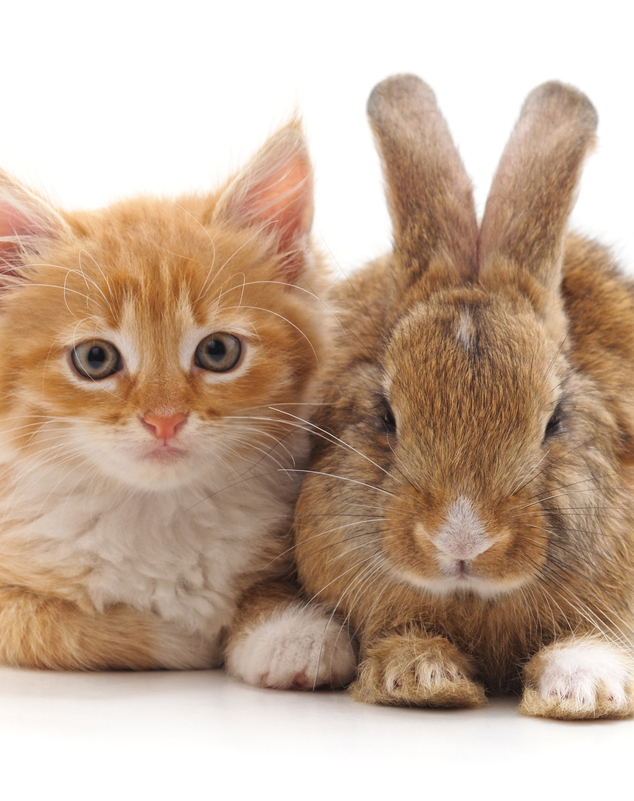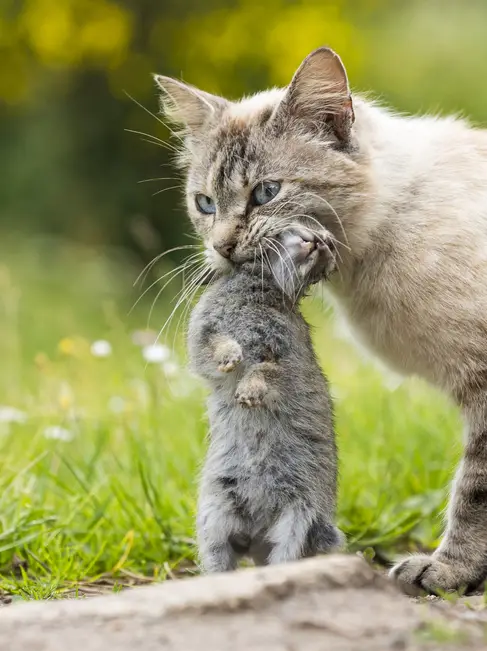Can Cats Eat Rabbit Food? Is It Healthy?
If you own both a rabbit and a cat and want to save money, you’re probably wondering, can cats eat rabbit food? While it may seem like a cost-efficient idea, there are some things you need to know first.
Rabbits and cats are very different creatures, especially in their diet. While rabbit food won’t poison a kitty, it doesn’t meet the dietary needs of a feline.

Below, I discussed this topic more and why feeding your cat rabbit food isn’t a good idea.
Is rabbit food safe for cats?
Cats are known for dietary indiscretion, so they will likely try to eat rabbit food when given a chance. Although it will not harm them, you shouldn’t tolerate this due to the following reasons:
1. Cats are obligate carnivores
The first reason cats should never eat rabbit food regularly is their dietary needs. Felines are obligate carnivores, which means they need animal protein to maintain their shape.
In contrast, rabbit food is often plant-based and made of grains, grasses, and vegetables. Overall, it’s okay if your cat snuck and ate a small amount, but it should never be considered an alternative for cat food.
Cats can still consume a small amount of plant-based food from time to time. It’s an excellent way to add fiber to their meals, but it should only take a small part of their diet.
2. Rabbit food has very high crude fat.
Rabbit food contains high crude fiber of around 22%. This is great for rabbits but not for felines.
Cats only need a maximum of 3.5% crude fiber in their diet. Too much will cause digestive upset, vomiting, diarrhea, and GI irritation.
Too much fiber is difficult for cats to digest. In the long run, it will do more harm than help if you keep feeding your pet rabbit food.
3. Rabbit food has no taurine.
Taurine is an essential amino acid for cats, which they need to maintain heart functions, digestion, normal vision, immunity, and more. It’s only found in animal-based proteins, which is why felines need a meat-based diet.
In relation to this, there’s very little taurine in rabbit food. If it’s continuously fed to cats, the lack of taurine will cause vision, digestion, and even heart problems.

4. Your cat will miss out on essential nutrients.
Rabbit food doesn’t contain the essential nutrients your cat needs. Remember that cats are not supposed to and should never be raised as vegans.
On the other hand, cats and rabbits still share similarities in their diet. Both needs enough protein, but from different sources.
5. Your cat may have allergic reactions.
Since rabbit pellets are made for bunnies, they may contain ingredients that could cause an allergic reaction in cats. Symptoms of allergies in cats include rashes, vomiting, diarrhea, hives, and sneezing.
If your cat exhibits these symptoms after consuming rabbit food, it’s best to consult a veterinarian. Some cats may have intense reactions to rabbit food ingredients that require veterinary attention.
6. Some cats may have an intolerance to rabbit food ingredients.
Intolerance can also occur in cats eating rabbit food. Food intolerance is the digestive system’s inability to break down a specific food ingredient.
This could likely happen to felines since rabbit food has a high fiber content. Also, rabbit food has too many plant ingredients, which the cat’s digestive system isn’t built to process.
What to do if your cat eats rabbit food?
If your cat only ate rabbit food once, there’s nothing to worry about. It’s not toxic and unlikely to cause life-threatening effects on your pet.
However, you should never tolerate this habit. If your cat sneaks on your rabbit’s hutch, you should take preventive steps.
This way, your feline pet won’t get used to consuming plant-based food. If you let them, your cat will be too full to eat its own diet.
But if your kitty vomits or suffers from diarrhea, you should observe it closely. You should take it to the vet if the symptoms don’t subside for 12 hours.

What happens if a cat eats hay?
Hay isn’t toxic to cats. After all, felines love eating grass when their tummies are upset.
However, anything in excess is bad for your cat’s health. Pet cats that consume hay regularly can suffer from recurring diarrhea and vomiting.
This is a bad thing since dehydration may set in, putting your cat’s life at risk. It can turn deadly in a matter of hours if not addressed.
Even if your cat seems to like it, never feed it hay intentionally. Again, cats aren’t herbivores, so plants should only be considered a tiny part of their diet.
Is it OK for cats to eat Timothy hay?
Timothy hay is used as an ingredient for horse and cattle feed. It’s also a delicate choice for rabbits, but it should never be given to cats as part of their diet.
It’s because Timothy hay has very protein and high fiber, which is a poor nutrient balance for felines. Even a small amount isn’t worth the risk for cats, especially if your pet has a sensitive stomach.
If you want to give your cat a dose of fiber, consider other nutritious leafy greens instead. Some good examples are spinach, lettuce, and broccoli.
What happens if a cat eats a rabbit?
Take note that cats and rabbits aren’t good pairs as house pets. Rabbits will trigger the hunting instincts of cats due to their quick movements.
In some cases, cats will hunt and eat rabbits when given a chance. If your kitty caught a rabbit in the wild, you should observe your pet for adverse reactions.
Wild rabbits are carriers of the Francisella tularensis bacterium, which causes “rabbit fever” or tularemia.
This condition will cause high fever in cats as well as swollen lymph nodes on the neck and head. In the worst cases, an affected cat may suffer from jaundice and organ system failure.
The good thing is that tularemia can be treated with early detection. The death rate among felines with tularemia is high, so you should seek immediate veterinary attention if your pet shows symptoms of the disease.

Are cats allergic to rabbit food?
Cats can be allergic to just about anything, including rabbit food. If your pet suffers from hives, itching, diarrhea, and vomiting after eating rabbit food, it’s a sign that your cat is allergic to it.
The best cure for this condition is to keep rabbit food away from your cat. Contrary to misconception, continuous exposure to the allergen will not cause tolerance.
In fact, continuous feeding of rabbit food to cats will only make things worse. You may end up with a hefty vet bill and a sick cat.
Conclusion
Rabbit food or pellets are unsuitable for cats and should never be considered an alternative to cat food. As mentioned earlier, rabbit pellets are mostly made of plant-based ingredients with no nutritional value to felines.
Feeding your cat dry rabbit food will do more harm than help. Your kitty will suffer from diarrhea, vomiting, and a slew of other symptoms.
Ultimately, it’s best to stick to a diet suitable for your cat. You can also consult your pet’s veterinarian if you need more guidance on your cat’s nutrition and overall health.
